tags:
waste |warming |tgrnews |tgr news |steve jones |sacrifice |recreation |protect our winters |pow |paris climate summit |lucas debari |fossil fuel burning |environmental activism |consumption |climate |chris steinkamp |angel collinson |activism
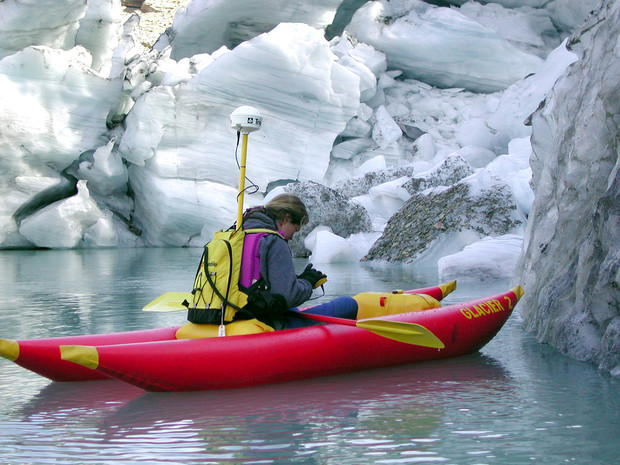 A climate scientist collects data in Glacier National Park. Efforts like this are important, but even this team had to burn fossil fuels to conduct their research. Wikimedia Commons photo.
A climate scientist collects data in Glacier National Park. Efforts like this are important, but even this team had to burn fossil fuels to conduct their research. Wikimedia Commons photo.
Living in the modern world can be an everyday study in hypocrisy. Clean water, open land and an unsullied sky are things that most of us wish to pass on to our children.
I myself am a perfect example of this hypocrisy. I care deeply for our planet, and I fear a future where it’s not habitable for our species. Yet I contribute actively to a process (climate change) that threatens to irreparably undercut my and the rest of humanity’s best intentions. The things I do that exacerbate climate change — like driving to go snowboarding, buying whatever’s cheap at the grocery store and even writing this article — are all insignificant on the surface, but day after day, they add up.
But I love driving, and flying, and snowboarding and all these other activities that in some abstract — but very real way — put me at odds with the Earth. In short, I’m human.
So much of what we do is harmful to the planet — whether we’re talking about the way we eat, the way we work, or the way we play. A lot of these problems are embedded in our society, and will take decades of political revolution to uproot. But being part of a generation — millennials — whose reputation consists of being addicted to instant gratification, the problem currently dwarfs our personal levels of engagement and comprehension.
It doesn’t matter if we care the Earth is warming — what matters is how that knowledge affects the decisions we make.
What About Our Toys?
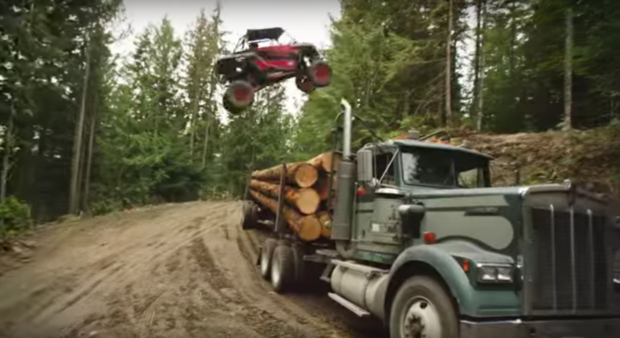 Let's face it, we're all entertained by blatant consumption. But in a warming world, just how much is too much? UTVUnderground photo.
Let's face it, we're all entertained by blatant consumption. But in a warming world, just how much is too much? UTVUnderground photo.
This Fall Jackson Hole hosted the environmentally-minded SHIFT Festival. Now in its third year, the purpose of the conference is to bring the actions sports and conservation communities together to address human-driven climate change with the intent of developing a unified message and strategy.
Pre-gaming this year’s SHIFT events, athletes Angel Collinson and Lucas Debari, as well as Protect Our Winters’ Chris Steinkamp and TGR co-founder Steve Jones sat down at the Asymbol Gallery to field questions regarding the changing climate and what the outdoor recreation industry is prepared to do in the face of this looming threat.
As the panel convened and journalists began asking their questions, it seemed like most of them were dancing around the enormous 6,000 lb. helicopter in the room. The real question seemed obvious, so I asked it:
Do we need to give up our toys? And if so, how do we encourage that process in a non-preachy way?
The Question: Do we need to give up our toys?
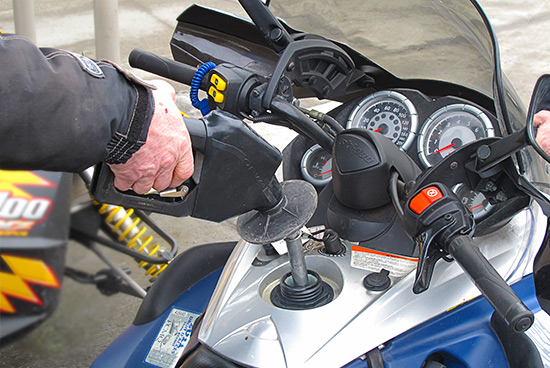 Climate change puts us all in the awkward position. Flickr Creative Commons photo.
Climate change puts us all in the awkward position. Flickr Creative Commons photo.
Wincing from the bomb-drop, Debari shot me a mischievous glance as Angel began her response.
“We get asked that question a lot, being athletes, flying around in helicopters, owning snowmobiles and trucks. It’s a big question we ask ourselves,” Collinson said. “But, if your toys are the things that make you passionate about the outdoors and that’s how you participate..."
We get asked that question a lot, being athletes, flying around in helicopters, owning snowmobiles and trucks. It’s a big question we ask ourselves.
"I mean — we live in a fossil-fuel-based economy, none of us are perfect, and it’s going to be a process of giving up our creature comforts and eventually giving up our toys," Collinson continued. "But I think the bigger thing is focusing on clean power, as that’ll do a lot more than if we all drive our cars one day less a week. So I say start there.”
RELATED: Killing Me Softly – The Truth About Utah's air pollution
A quick aside: The Clean Power Plan mentioned by Collinson is an Obama Administration proposal that would cut carbon pollution from U.S. power plants by 32% by 2030. Unsurprisingly, power installations in the U.S. are responsible for almost a third of all domestic carbon emissions. For more information on the plan, see Ryan Dunfee’s climate breakdown from August.
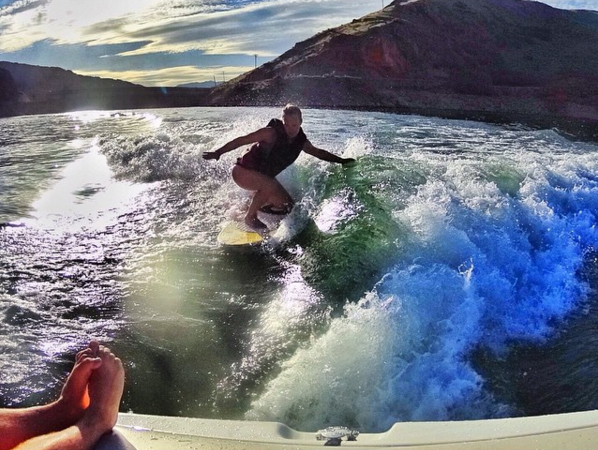 At TGR, we love wake-surfing! But on the flip-side, it's one of many ways people burn fossil fuels to have fun. TGR photo.
At TGR, we love wake-surfing! But on the flip-side, it's one of many ways people burn fossil fuels to have fun. TGR photo.
Piggybacking on Angel’s statement, POW’s Steinkamp was more pointed as he cautioned against biting off more than we could chew, reminding the audience that in matters of personal conduct, messaging can be a very slippery slope.
What ‘toys’ are we talking about? Is it a private jet? Is it a snowmobile? Or is it your car that you need to get to work?
“What ‘toys’ are we talking about? Is it a private jet? Is it a snowmobile? Or is it your car that you need to get to work?” Steinkamp asked. “Once you go down that road, you almost have to go all the way, or you say ‘Nobody’s perfect — we’re doing the best we can,’ and then you gotta make sure you do the best you can.”
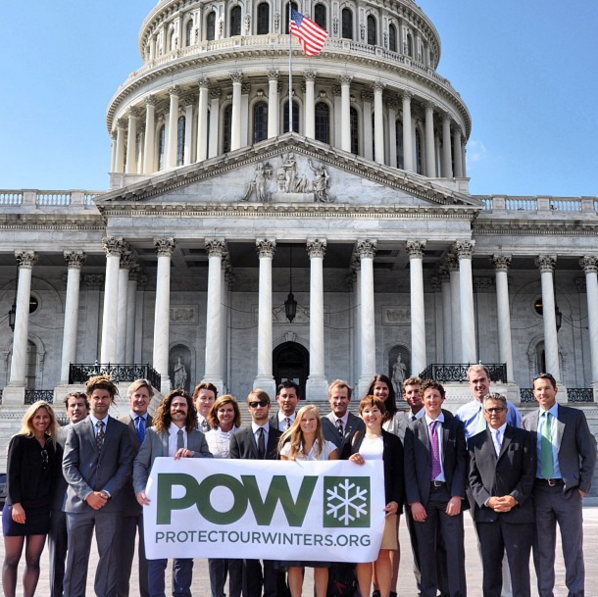 Protect Our Winters takes a group shot in Washington D.C. TGR photo.
Protect Our Winters takes a group shot in Washington D.C. TGR photo.
In his statement, the POW director hits a central point in making the distinction of ‘want’ versus ‘need.’ A lot of the ways in which we burn fossil fuels are extraneous to our everyday lives — they support activities that will bring us pleasure, but they aren’t necessary for everyday survival.
People don’t need to fly around the Earth to go surfing, but many folks do need to drive to work to support their families. We make choices.
Turning, Steinkamp pointed towards Collinson and Debari. “These guys are classic examples of that. They’re spending time in schools and they’re going to Washington. Yeah, they have to spend some time in a heli because that’s what they do. I drive my car to work, but hopefully I’m doing more good than bad.”
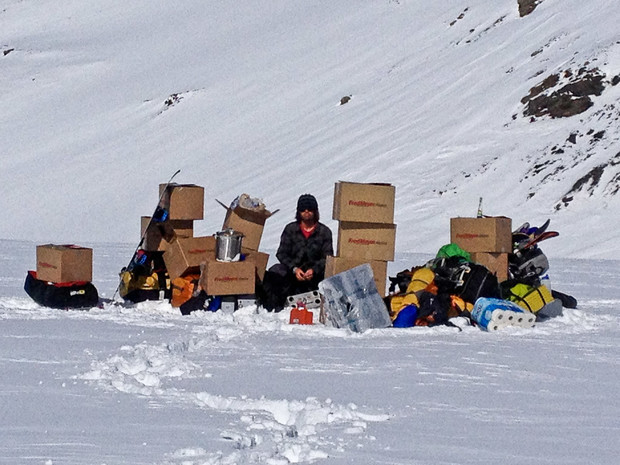 TGR film-shoots consume a lot of resources, but the Jones' have taken strong measures to offset their impacts. TGR photo.
TGR film-shoots consume a lot of resources, but the Jones' have taken strong measures to offset their impacts. TGR photo.
While answering, Steve Jones acknowledged that he’s gotten the question many times. His response: “One thing we all have to understand is that we’re definitely not perfect.”
RELATED: What TGR did for Sustainability in 2014
Since its founding, TGR has been an industry leader by contributing to The Surfrider Foundation, 1% For the Planet, Protect Our Winters and BICEP (Business for Innovative Climate & Energy Policy). When Jones testified before Congress regarding the perils of climate change, the first thing he was asked was “If you guys care about this issue, why are you out in the mountains flying helicopters?”
He gets the question a lot.
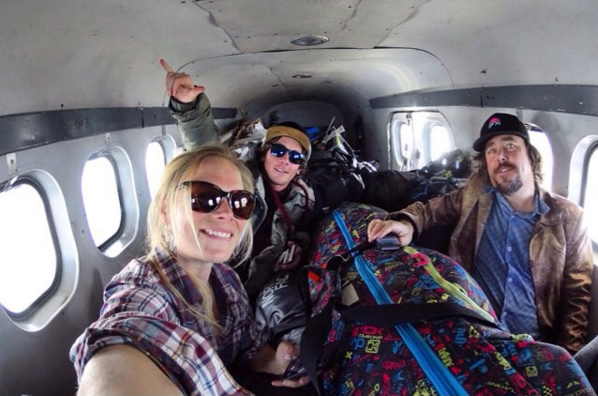 Angel Collinson, Sammy Carlson and Todd Jones fly to shoot some footage. When your film set is at the ends of the Earth, walking just isn't an option. TGR photo.
Angel Collinson, Sammy Carlson and Todd Jones fly to shoot some footage. When your film set is at the ends of the Earth, walking just isn't an option. TGR photo.
“We’re putting energy within the company [TGR] toward evolving and minimizing our footprint. … That doesn’t completely mitigate it or mean that it’s okay — it would be better to just abstain," Steve Jones said.
"But some of the tools we use right now, we don’t necessarily have a replacement for getting these sweeping cinematic aerials of the Himalaya or Alaska," Jones continued. "We feel like those are one of the things that draw more people into the environment, that do serve to inspire people, that do have the ability to touch that emotional chord."
It’s a push and pull between your personal morality and what you can do.
"And so, it’s a push and pull between your personal morality and what you can do. You’re always inherently as a human looking for ways to justify like ‘well, I can do this because of that’ — So I don’t think it’s a cut and dry answer.”
Once again touching on the tradeoffs associated with burning fuel for a higher purpose, Jones suggested that the ability to inspire his audience and get people to care about nature is the end that — in his case — justifies the means.
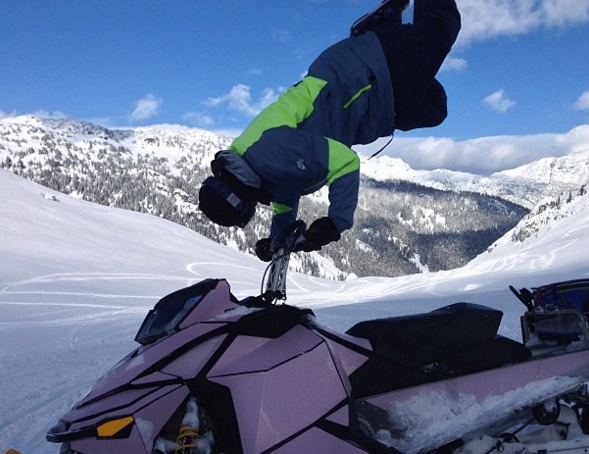 Lucas Debari handplants atop one of his toys. In a warming world, can we continue to burn fossil fuels for recreation? Lucas Debari photo.
Lucas Debari handplants atop one of his toys. In a warming world, can we continue to burn fossil fuels for recreation? Lucas Debari photo.
Taking a cue from Jones’ statement on personal morality, Debari stressed the importance of self-sacrifice.
“We all have to sacrifice. Nobody wants climate change to be real — I wish it wasn’t. … But at some point, you have to decide internally ‘How much am I willing to sacrifice to promote what I feel needs to be happening?’ ”
How much am I willing to sacrifice to promote what I feel needs to be happening?
In saying this, Debari recognizes that the path to activism isn’t about yelling loudly and telling people what to do, but instead, it’s about being the change you want to see in the world.
Echoing Steinkamp’s statement from earlier in the forum, the big-mountain snowboarder emphasized that instead of figuring out what someone else can do to mitigate the problem, the best place to start is to determine what your personal best looks like, set the example for yourself, and then hold the line.
And maybe one day, hopefully, others may see and follow that example.


